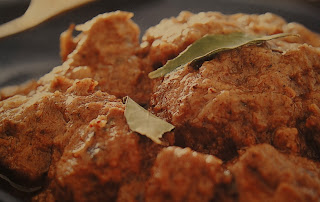 I have many fond memories of the good old fashioned sponge cake, as it was something I grew up having for afternoon tea at my Grandparents house. It was always feather light, fluffy and usually filled with cream and jam or sometimes filled with cream and then iced with either passion fruit or coffee icing.
I have many fond memories of the good old fashioned sponge cake, as it was something I grew up having for afternoon tea at my Grandparents house. It was always feather light, fluffy and usually filled with cream and jam or sometimes filled with cream and then iced with either passion fruit or coffee icing.The advice I was given from both my Grandmother and Mother on how to master the art of the mighty sponge, was to always use fresh eggs, sift the dry ingredients several times and take care when adding the dry ingredients not to over beat.
It wasn't until recently that I first tasted 'Ginger Fluff' sponge and whilst I still love the a traditional sponge, I do love the spicy gingerness of the Ginger Fluff.
Icing sugar, to dust
Divide mixture evenly between the two tins and bake in pre heated oven for 20 mins., until sponge is light golden in colour and bounces back when gently touched with fingertips. Allow to cool in tins for 5 mins., (sponges will shrink from the sides of the tins), then turn out onto wire rack to cool completely.
Sandwich sponges together with whipped cream and dust with icing sugar.
 Originating from the south of India this curry gets its name from the city of Madras which is now know as Chennai. Typically in India this recipe would be made with Goat as it is more redely available, however goat can be tough cooked in this manner so the recipe suggests using lamb (beef could also be used).
Originating from the south of India this curry gets its name from the city of Madras which is now know as Chennai. Typically in India this recipe would be made with Goat as it is more redely available, however goat can be tough cooked in this manner so the recipe suggests using lamb (beef could also be used).
